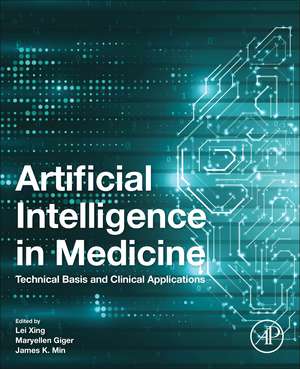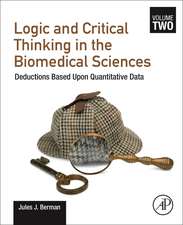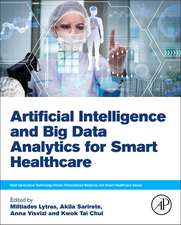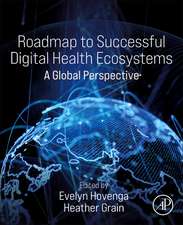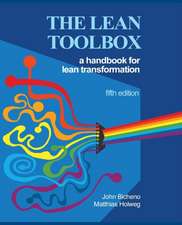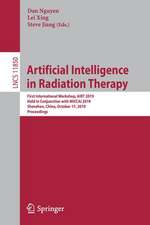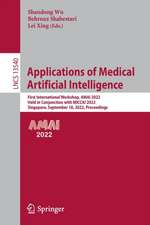Artificial Intelligence in Medicine: Technical Basis and Clinical Applications
Editat de Lei Xing, Maryellen L. Giger, James K. Minen Limba Engleză Paperback – 3 sep 2020
The integration of AI can occur throughout the continuum of medicine: from basic laboratory discovery to clinical application and healthcare delivery. Integrating AI within medicine has been met with both excitement and scepticism. By understanding how AI works, and developing an appreciation for both limitations and strengths, clinicians can harness its computational power to streamline workflow and improve patient care. It also provides the opportunity to improve upon research methodologies beyond what is currently available using traditional statistical approaches. On the other hand, computers scientists and data analysts can provide solutions, but often lack easy access to clinical insight that may help focus their efforts. This book provides vital background knowledge to help bring these two groups together, and to engage in more streamlined dialogue to yield productive collaborative solutions in the field of medicine.
- Provides history and overview of artificial intelligence, as narrated by pioneers in the field
- Discusses broad and deep background and updates on recent advances in both medicine and artificial intelligence that enabled the application of artificial intelligence
- Addresses the ever-expanding application of this novel technology and discusses some of the unique challenges associated with such an approach
Preț: 963.22 lei
Preț vechi: 1270.44 lei
-24% Nou
Puncte Express: 1445
Preț estimativ în valută:
184.37€ • 200.33$ • 154.97£
184.37€ • 200.33$ • 154.97£
Carte tipărită la comandă
Livrare economică 14-28 aprilie
Preluare comenzi: 021 569.72.76
Specificații
ISBN-13: 9780128212592
ISBN-10: 0128212594
Pagini: 568
Ilustrații: 100 illustrations (50 in full color)
Dimensiuni: 191 x 235 mm
Greutate: 1.13 kg
Editura: ELSEVIER SCIENCE
ISBN-10: 0128212594
Pagini: 568
Ilustrații: 100 illustrations (50 in full color)
Dimensiuni: 191 x 235 mm
Greutate: 1.13 kg
Editura: ELSEVIER SCIENCE
Public țintă
Clinicians, medical doctors, bioinformaticians, bioengineers, data scientistsCuprins
I Introduction
1. Artificial intelligence in medicine: past, present, and future2. Artificial intelligence in medicine: Technical basis and clinical applications
II Technical basis
3. Deep learning for biomedical videos: perspective and recommendations4. Biomedical imaging and analysis through deep learning5. Expert systems in medicine6. Privacy-preserving collaborative deep learning methods for multiinstitutional training without sharing patient data7. Analytics methods and tools for integration of biomedical data in medicine
III Clinical applications
8. Electronic health record data mining for artificial intelligence healthcare9. Roles of artificial intelligence in wellness, healthy living, and healthy status sensing10. The growing significance of smartphone apps in data-driven clinical decision-making: Challenges and pitfalls11. Artifical intelligence for pathology12. The potential of deep learning for gastrointestinal endoscopy-a disruptive new technology13. Lessons learnt from harnessing deep learning for real-world clinical applications in ophthalmology: detecting diabetic retinopathy from retinal fundus photographs14. Artificial intelligence in radiology15. Artificial intelligence and interpretations in breast cancer imaging 16. Prospect and adversity of artificial intelligence in urology17. Meaningful incorporation of artificial intelligence for personalized patient management during cancer: Quantitative imaging, risk assessment, and therapeutic outcomes18. Artificial intelligence in oncology19. Artificial intelligence in cardiovascular imaging20. Artificial intelligence as applied to clinical neurological conditions21. Harnessing the potential of artificial neural networks for pediatric patient management22. Artificial intelligence—enabled public health surveillance—from local detection to global epidemic monitoring and control
IV Future outlook
23. Regulatory, social, ethical, and legal issues of artificial intelligence in medicine24. Industry perspectives and commercial opportunities of artificial intelligence in medicine25. Outlook of the future landscape of artificial intelligence in medicine and new challenges
1. Artificial intelligence in medicine: past, present, and future2. Artificial intelligence in medicine: Technical basis and clinical applications
II Technical basis
3. Deep learning for biomedical videos: perspective and recommendations4. Biomedical imaging and analysis through deep learning5. Expert systems in medicine6. Privacy-preserving collaborative deep learning methods for multiinstitutional training without sharing patient data7. Analytics methods and tools for integration of biomedical data in medicine
III Clinical applications
8. Electronic health record data mining for artificial intelligence healthcare9. Roles of artificial intelligence in wellness, healthy living, and healthy status sensing10. The growing significance of smartphone apps in data-driven clinical decision-making: Challenges and pitfalls11. Artifical intelligence for pathology12. The potential of deep learning for gastrointestinal endoscopy-a disruptive new technology13. Lessons learnt from harnessing deep learning for real-world clinical applications in ophthalmology: detecting diabetic retinopathy from retinal fundus photographs14. Artificial intelligence in radiology15. Artificial intelligence and interpretations in breast cancer imaging 16. Prospect and adversity of artificial intelligence in urology17. Meaningful incorporation of artificial intelligence for personalized patient management during cancer: Quantitative imaging, risk assessment, and therapeutic outcomes18. Artificial intelligence in oncology19. Artificial intelligence in cardiovascular imaging20. Artificial intelligence as applied to clinical neurological conditions21. Harnessing the potential of artificial neural networks for pediatric patient management22. Artificial intelligence—enabled public health surveillance—from local detection to global epidemic monitoring and control
IV Future outlook
23. Regulatory, social, ethical, and legal issues of artificial intelligence in medicine24. Industry perspectives and commercial opportunities of artificial intelligence in medicine25. Outlook of the future landscape of artificial intelligence in medicine and new challenges
Recenzii
"Packed full of latest developments and expert discussions, Artificial Intelligence in Medicine covers a wide range of general and specialty medical AI topics. The discussed medical AI applications are fueled with a vast range of medical big data such as imaging, video, text, audio, genomics, demographics, and laboratory measurements, and these include both standard medical data and those mass collected from mobile devices. In addition to covering the technical basis and computing algorithms, the book also details the unique success and challenges in each clinical area ranging from specific medical problems, different health specialties, to global epidemic monitoring and control. The book also folds in the regulatory and industry perspectives as well as experts’ outlook of the future of medical AI. Compared with similar books on the market, Artificial Intelligence in Medicine is uniquely suited as a foundation reading for anyone interested in working with AI in medicine. Unlike single‐author books such as Deep Medicine, Artificial Intelligence in Healthcare, and Machine Learning and AI for Healthcare that were written to introduce the medical AI topic to and engage a general discussion with lay audience, this book is a comprehensive, scientific, and technical volume contributed by a large team of expert authors for professional and scientific audience. Compared with other relevant technical books such as Big Data in Radiation Oncology, Radiomics and Radiogenomics, and Machine Learning in Radiation Oncology, this book goes beyond radiation oncology and medical physics to comprehensively cover the wide field of medicine. For medical physics readers, the book not only touches on the applications familiar to us but also offers valuable inspirations from those others that we may not usually encounter in our specialty. The wide range of applications and topics addressed by the book could help readers from any field to frame a global perspective on AI in medicine.The field of AI is rapidly evolving, making any paper publication difficult to encompass this ever‐changing body of knowledge. Released in September 2020, Artificial Intelligence in Medicine provides the best available comprehensive and fundamental volume on the topic. The book highlights a current dichotomy: despite the enormous promise AI holds in medicine, it has yet to show revolutionary clinical benefits, indicating that we may still be at the dawn of a new AI age in medicine. Written by a large team of influential editors and authors, Artificial Intelligence in Medicine undoubtedly provides a great resource for anyone interested in playing a part in this exciting, upcoming new age." --Journal of Applied Clinical Medical Physics
